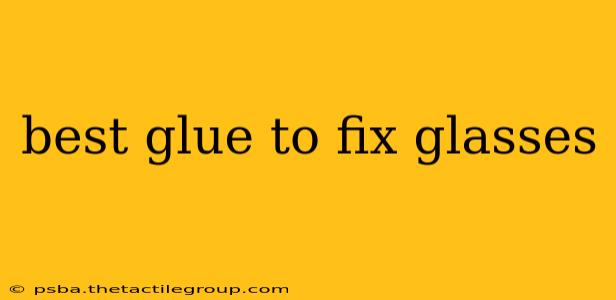Broken glasses? Don't panic! While a trip to the optician is often necessary for major repairs, many minor fixes can be handled at home with the right adhesive. Choosing the wrong glue, however, can lead to further damage or a less-than-perfect repair. This guide will help you select the best glue for fixing your glasses and provide tips for a successful repair.
Understanding the Challenges of Glass Repair
Repairing glasses requires a glue that meets several specific criteria:
- Optical Clarity: The glue should be completely transparent once dried to avoid distorting your vision. Cloudy or colored glue is a definite no-go.
- Strength and Durability: The bond needs to be strong enough to withstand the daily wear and tear of glasses, including bending and pressure.
- Flexibility: Glasses frames often flex slightly. A rigid glue could crack under this pressure, leading to further breakage. A flexible adhesive is crucial.
- Fast Drying Time: While not always essential, a quicker drying time means you can get back to using your glasses sooner.
- Non-Toxicity: The glue should be safe for use near your eyes and skin.
Top Glue Choices for Fixing Glasses
Several adhesives meet these criteria, each with its own strengths and weaknesses:
1. Cyanoacrylate (Super Glue)
Cyanoacrylate adhesives, commonly known as super glue, are a popular choice for quick fixes. However, use extreme caution. They bond incredibly quickly and can be difficult to work with. A tiny drop is all you need, and any excess is extremely difficult to remove. Choose a gel formula over a liquid formula for better control. This type of glue is best suited for small cracks or loose components rather than major repairs.
Pros: Strong bond, fast drying time. Cons: Difficult to control, can be brittle, may yellow over time.
2. UV-Curing Adhesive
These adhesives harden when exposed to ultraviolet (UV) light. They offer excellent control because the glue remains workable until exposed to the UV light, allowing for precise placement. This makes them ideal for intricate repairs. However, you'll need a UV light source for curing.
Pros: Precise application, strong bond, clear finish. Cons: Requires UV light source.
3. Epoxy Glue
Epoxy glues are two-part adhesives that offer strong, durable bonds. They are more forgiving than super glue and offer a longer working time before setting. While generally durable, they might not be as flexible as some other options, so consider this if your frame is prone to bending. Ensure you choose a clear epoxy formula designed for optical applications.
Pros: Strong bond, longer working time, durable. Cons: Longer drying time, may require mixing.
Tips for a Successful Repair
Regardless of the glue you choose, follow these steps for the best results:
- Clean the surfaces: Thoroughly clean and dry the broken areas with a lint-free cloth and isopropyl alcohol to ensure a strong bond.
- Apply sparingly: Use only a tiny amount of glue – less is more!
- Clamp or hold securely: Use clamps, binder clips, or even strong tape to hold the pieces together while the glue dries. Ensure the pieces are aligned correctly.
- Cure according to instructions: Follow the manufacturer's instructions carefully regarding drying time and any special curing requirements.
- Don't rush: Allow the glue to dry completely before wearing your glasses.
When to See an Optician
While these glues can handle minor repairs, some damage requires professional attention. Consult an optician if:
- The damage is significant.
- The frame is severely bent or broken.
- The lenses are cracked or damaged.
- You're unsure how to repair the damage.
Remember, attempting complex repairs yourself could lead to further damage. Professional repair ensures your glasses are properly fixed and your vision is protected.
This guide offers insights into choosing the right glue for fixing your glasses. Remember to always prioritize safety and consult a professional when necessary. Choosing the appropriate adhesive and carefully following instructions will help ensure a successful and long-lasting repair.

